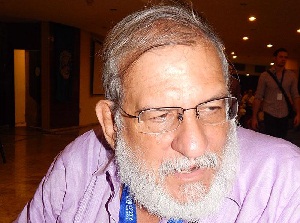 Looking to establish a consensus on scientific research exploring the mental and physical bases of thought and emotion, prominent experts met in Havana August 31-September 4, at the 18th World Congress of the International Psychophysiology Organization.
Looking to establish a consensus on scientific research exploring the mental and physical bases of thought and emotion, prominent experts met in Havana August 31-September 4, at the 18th World Congress of the International Psychophysiology Organization.
The event, which has previously been held only in developed countries, took place for the first time in Latin America, in Cuba, a clear demonstration of broad recognition for the island’s work to create tools to diagnose and treat brain diseases.
During the event, over 370 sector representatives from Canada, the United States, France, Italy, Japan, Russia, Mexico and Brazil, attended five pre-congress workshops, nine keynote lectures and 39 symposiums, organized by the International Psychophysiology Organization (IOP), Cuban Neurosciences Society, and Cuban Neurosciences Center (Cneuro).
The development of this discipline on the island dates back to the 1960s, when it was energetically promoted by Comandante en Jefe Fidel Castro, who recognized the great importance of brain research in treating psychiatric conditions, birth defects and problems associated with gross-motor skills, according to Pedro Antonio Valdés Sosa DSc. who has spent decades working on brain mapping.
Thus, in 1969, the Cneuro launched a study with the use of computers into electrical brain activity which led to the development of Electrical Impedance Tomography, used in investigations linked to neural activity in learning processes and changes associated with aging.
“Psychophysiology is a branch of the neurosciences concerned with the physiological bases of psychological processes, diseases and the relationship between mind and body,” explained Valdés Sosa, also deputy director of Research at Cneuro, to Granma International. “The field has experienced a great surge in recent years as we are trying to understand the pathologies produced in the brain. What defines Cuba are its efforts to carry out this advanced science thinking about how to bring scientific results to all peoples living in the poorest countries.”
María Luisa Bringas Vega, with a PhD in Psychological Sciences, agrees, noting that the Congress aims to bring the knowledge of the leading international laboratories based in developed countries to Third World Nations, where there exist many different problems. In this regard, she mentioned hunger, poverty and malnutrition, all of which constitute important concerns for Southern nations.
Bringas Vega explained that issues relating to the link between the physiological functioning of the brain and quality of life, healthy aging, and an emotionally stable childhood were discussed during the event; while participants also addressed ways to tackle the alarming growth in brain conditions related to population aging, such as dementia.
She also highlighted the results of broad studies conducted by Japanese scientists in the field of brain mapping, noting that a finite conclusion is yet to be reached given the influence of socio-cultural factors. “These investigations don’t work the same way in Latin America or on other continents, but we can benefit from the methodology in order to apply them in our countries,” stated the Cuban expert.
Of a similar opinion is Thalía Harmony Baillet DSc, researcher at the National Autonomous University of Mexico’s Neurobiology Institute, who has developed brain mapping techniques, specifically in children with motor-cognitive disorders from birth through eight years of age.
Baillet offered a keynote lecture during the event, addressing the differences in behavioral attention between premature and full-term babies, and commenting on early assessment of diagnostics and treatment on infants.
Meanwhile, Colombian psychiatrist Felipe Agudelo Hernández who works at the San Juan de Dios Clinic in the city of Manizales which treats adults and children suffering from illnesses such as schizophrenia, bipolar disorder, different forms of autism, depression, and anxiety, attended the Congress in order to obtain information on issues related to child psychiatry.
Agudelo Hernández is currently conducting research into emotional responses noting, “Brain studies are going through a new era and are more closely connected with neurobiology, neurophysiology, affective and social neurosciences, therefore we must remain well-informed as to what is happening at the psychophysiological level to be able to combine the scientific nature of these sciences and strengthen psychiatry,” he stated.
(Granma)